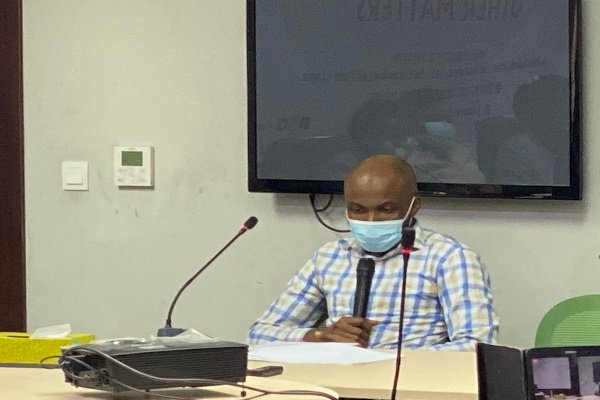Reddington Hospital has told the Lagos State Judicial Panel of Enquiry and Restitution for Victims of SARS related abuses and other matters that it treated an overwhelming number of persons with gunshots or other wounds from the Lekki Toll Gate on the night of last October 20.
It said the number of persons brought to the facility that night were so many that staff at the hospital’s Lekki and Victoria Island branches were overwhelmed by the crowd.
One of the hospital’s trauma and orthopedic surgeons, Babajide Lawson, told the panel that he attended to the patients that night.
He described the situation as “a mass gathering”.
According to him, the medical facility may not have been able to keep complete records because of the number.
The Nigerian Army has been accused of opening fire with live bullets on peaceful protesters at the Lekki Toll Gate demanding an end to police brutality using the hash tag #EndSARS.
The protesters have submitted petitions to the panel alleging that men of the Army’s 81 Division shot at and killed several #EndSARS protesters that night, a claim the Army denied.
The Army has, however, shunned further appearance at the panel, without giving any reason.
Lawson, who answered a summons to the hospital following application by #EndSARS protesters’ lawyer, Mr Adesina Ogunlana, testified he personally treated six of the patients that night.
He said from the next day, the number of patients tripled.
He said he had to keep shuttling between the hospital’s Victoria Island branch where he was stationed and its Lekki facility to help out.
The hospital had earlier appeared before the panel on January 6, to represent medical reports of about 20 patients brought to the hospital on the night of the Lekki shooting.
Giving his evidence Lawson testified that the number of victims of the shooting who visited the hospital increased after the first night.
He said: “Being in charge of trauma means anybody that is involved in any form of traumatic injury, accident, gunshot and others will have to go through me first.
“I saw a couple of them, the ones that needed admission, I admitted and the ones that did not were taken care of.
“The thing is on that October 20, a lot of patients presented at the Lekki office, that’s the Lekki Hospital. I was shuttling between there and the VI office, which I represent.
“Later on the night of 20th, I also went to the Lekki office to assess and determine what amount of assistance they would require from me. I transferred some of the patients from the Lekki Hospital to the VI office.
“On the first night, there were about six patients that I saw, subsequently, other patients came, trickled in, as days continued.”
The surgeon said the patients had varying degrees of injuries and were treated.
During cross-examination by a lawyer to some of the victims of the shooting, Adeyinka Olumide Fusika, SAN, the surgeon faced questions on whether he authored any of the medical reports tendered to the panel, among others.
Olumide-Fusika said: “You will agree that there is none for Samuel Asola, who is a petitioner before this panel and my own client.
“This client of mine says he was treated of gunshot wounds at your facility. He has pictorial proof of being actually treated. If that were to be true, it means your evidence before this panel is not comprehensive, it is not exhaustive of the people you treated of gunshot of wounds.”
Responding, Lawson explained that there was likelihood that the hospital did not capture the records of all the patients due to the crowd.
He said he did not author any of the medical reports as it was the duty of doctors handling the patients.
Lawson said: “On the night of this event, in the Lekki facility, when patients were brought in, it was a mass gathering situation in which case you have a large number of people presenting at the same time, literarily overwhelming the facility.
“In that kind of situation, there are lots of cases that might be compromised. If this patient says he was treated at the hospital, he can present at the hospital and get a medical report.”
The lawyer further asked whether the hospital extracted pellets from the patients as there were many cases of gunshots, especially in the case of Nnaji Mabel who had a pellet in her abdomen.
Dr Lawson: “As indicated in the report, we did not extract the pellet. I admitted the responsibility, we reviewed her CT and records, we determined that she did not need anything extensive, and she was treated and allowed to go.”
Olumide-Fusika: “It is normal to have pellets in your body and just go home?”
Dr Lawson: “Yes, it is possible. If there is a gunshot injury and the bullet does not in any way endanger the body, the pellet can remain.”
The surgeon explained that some pellets were removed and they would be handed to the police in accordance with medical protocols.
Some other patients, he added, sustained “entry” and “exit” bullet wounds.
The surgeon said: “In normal process, protocol is that if there is a gunshot injury and extracted the bullet, the police will have to come and the bullet be handed over.
“For the patients I treated, I did not extract any bullet; the patient that had pellet did not require a removal.”
Seeking clarification, the lawyer representing the Lagos State Government, Olukayode Enitan, said many of the medical reports presented by Reddington Hospital did not add up.
Enitan said: “We applied to Reddington Hospital; we requested the hospital to produce the case notes of the patients whose reports have been presented.
‘’The reason for this is that when we went through the reports, too many of them do not add up, some are outrightly contradictory.
“We believe that the case notes will more than likely shed light on whatever it is. If it is a summation of actual events, the case notes will show that, that is why we made that application.
“It is very necessary that we have the case notes before the doctors are presented for cross-examination,” Enitan said.
Responding, the panel’s lawyer, Jonathan Ogunsanya, said the hospital had been served to present the case notes.
The hospital’s lawyer admitted they were served on Friday.
“We didn’t have enough time to go through the necessary process as required. However, we were able to prepare one or two, because there were different batches of patients that were treated.”
Panel chairman, Judge emeritus Dorris Okuwobi, ruled that case notes should not stop the presentation of evidence of the doctors and another date could be given for cross-examination.
Justice Okuwobi adjourned till February 12 to allow the state government’s lawyer cross-examine Dr Lawson.




